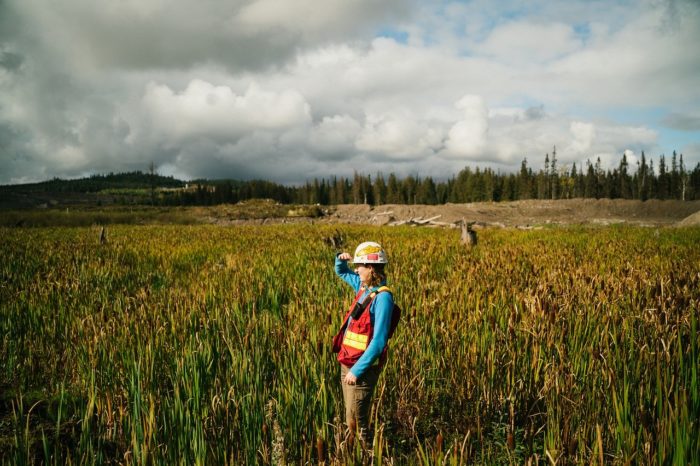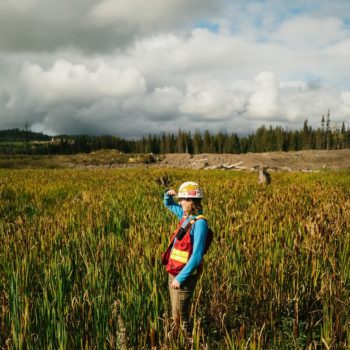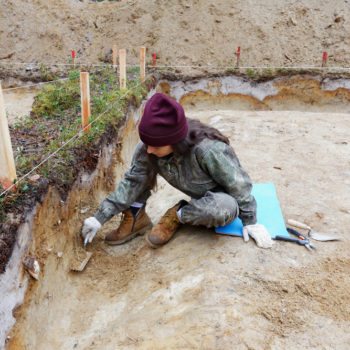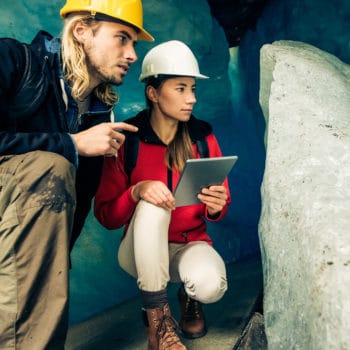Why We Love It
-
$105,720Potential Avg. Salary*
-
Growing DemandJob Outlook
* Salary & growth data is based on the recent Bureau of Labor and Statistics data published at https://www.bls.gov/oes/current/oes192042.htm for 19-2042 Geoscientists, except hydrologists and geographers 11/2021. Based on national data, not school-specific information. Conditions in your area may vary.
Geology majors study the earth and all of its components: its climate, matter, lifeforms, hazards, and renewable and nonrenewable resources.
This education prepares students for environment-focused careers, such as geologist, oceanographer, volcanologist, or conservationist. If you’re interested in a career in environmental policymaking, a bachelor of science in geology may be the right degree for you.
What is a Degree in Geology?
The Ozone layer, the earth’s core, the rainforests, the depths of the ocean, the coal mines, and volcanos—these are all things that Geologists study, and topics you might undertake if you choose to major in Geology.
Geologists are interested in more than just rocks. They study the environment as a whole, seek to understand how the components that make up this planet operate and are impacted by its inhabitants, and strive to protect that planet and its creatures and nonrenewable resources.
Geology students take both general and specialized courses. Most choose a focus topic—such as petrology, hydrology, climate change, or paleontology—and concentrate their studies within that focus area.
Generally, a geology degree is a starting point in a scientist’s education, with most students continuing on to graduate school to earn higher degrees and enter research and analysis roles. However, even those that only earn a bachelor’s degree can find work in their field after graduation.
Recommended Schools
What Courses Would I Take For a Major in Geology?
- Environmental Geology
- Environmental Hydrogeology
- Oceanography
- Remote Sensing
- Introduction to Geographic Information Systems
- Introduction to Depositional Models
- Environmental Geochemistry
- Introduction to Petroleum Geology
What Jobs Can You Get with a Degree in Geology?
Demand for geology program graduates is expected to grow faster than average in the coming decade due to three major factors: the need for renewable energy, increased awareness of the importance of responsible land management, and an increased focus on environmental protection.
For this reason, geology graduates shouldn’t struggle to find work in their field after graduation, even if they forgo graduate school and enter the job market with only a bachelor’s degree in geological studies.
How Long does it take?
A bachelors in Geology will have a typical length of 4 years in a full time schedule. That said, there are many ways to speed up the timeframe by either taking more units via online coursework, community college, or taking free classes at OnlineDegree.com that could transfer to universities in the US.
Online Geology Degree
Online geology programs do exist at many universities but aren’t widespread in their availability. Most of the courses that you would need to take for the degree like Environmental Geology, Geochemistry, Remote Sensing, etc are conducive to an online-based format in addition to normal general education and elective courses one would take.
In some cases, students may be required to attend periodic field camps to get practical experience needed to develop their knowledge and skills. It will all depend on the particular university and program.
If you already have a bachelor’s degree in geology or a related field such as physics or engineering, you may consider earning an online postgraduate degree. For example, a Master’s in Geology.
Online programs for this type of Master exist as well and are usually available online except for laboratory and field workshops that students have to attend.
What Can You Do With a Geology Degree?
Geology is the science of studying the Earth. Geologists play a major role in tackling the major environmental concerns including climate changes and desertification. Their role is also vital for the extraction of underground treasures including minerals, petroleum or water resources.
Studying geology can be challenging but also exciting for students. It is the only window to the mysterious 4.5 billion history of Earth. It also provides the big picture about the major problems facing our planet in a way that is not available by other study disciplines.
Moreover, it is a multidisciplinary science that integrates various basic sciences and subjects.
What does a Geology student learn?
Geology is closely related to earth science and geoscience. Geology is the narrowest focus of the three focusing on studying the components of the earth and their formation.
It also includes studying fossils, soil components and other related topics. Geoscience adds to these topics the study of oceans, seas, rivers and lakes. Earth science is the broadest involving the study of astronomy, and meteorology. Students studying geology are commonly required to complete the following courses:
- Studying geology requires studying the main branches of basic sciences including chemistry, physics, biology and mathematics with a focus on using these sciences to study the Earth’s properties.
- Geology programs also involve more advanced courses:
- Meteorology: the study of the atmosphere and weather forecasting.
- Mineralogy: studying the physical and chemical properties of minerals in addition to their crystal structures.
- Tectonics: studying the structure and characteristics of the earth’s crust.
- Stratigraphy: studying the earth’s strata (layers) and their positioning relative to each other. This is mainly used to evaluate the geological timing of fossils or archaeological remains.
- Hydrology: studying the movement of water as oceans, seas, rivers or springs on the Earth in relation to land.
- The majority of geology programs require students to complete field studies since geology careers usually involve much fieldwork. Students are usually required to complete a thesis project.
Now I have the Geology Degree… where can I work after graduating?
There is worldwide increasing attention to energy resources, environmental concerns and pure water availability. Accordingly, the demand for geologists is expected to rise in the coming years. Geology graduates should consider several options for their careers:
- Scientific research: geologists provide answers related to the origin and history of Earth. They also work on dating fossils and archeological remains thus providing valuable information to biology and other related sciences. Geology researchers typically work in universities or independent research centers.
- Civil engineering and construction: geologists make important decisions related to the materials, foundations and other considerations related to construction. These decisions are based on the nature of the soil. They also provide solutions to constructions in special conditions as building bridges in deep water or on mountains.
- Water resources: studying hydrogeology is an essential part of studying geology. Accordingly, geologists can work at companies managing water resources. They can make decisions related to locating undergraduate waters or protecting available water resources from pollution or overconsumption.
- Natural resources: companies working in petroleum or minerals. Geologists play the initial role in the discovery of underground resources. Studying the properties of the earth provides indications for the presence of oil, natural gas, gold or other valuable materials. This is the highest-paying career option for geologists.
- Governmental Entities: Geologists can also get hired by governmental entities as environmental protection agencies, the National Oceanic and Atmospheric Administration, the Department of Interior and the Bureau of Land Management.
- Self-Employed: Experienced and qualified geologists may work as self-employed consultants to firms which is a challenging but highly rewarding career choice.
Should I Choose a Geology Degree?
If you care about the environment and you feel concerned about pollution or climate change, you should probably study geology. Geology students usually have field trips to unique natural places. They play a critical role in providing solutions for environmental problems such as desertification, climate change or water pollution. This explains the rising demand for geologists around the world. Learning Geology will help you develop your ability to link the small pieces of a case and see the big picture of the dangers facing our planet.
Some Skills and Applications You Will Use on the Job:
- Adaptive to special living conditions: much of the geology work requires field trips to remote unpopulated areas.
- Data analysis: geologists deal with things that are found thousands of meters below the ground. Accordingly, they depend on data from various indicators to determine what is present in the ground, at which levels and how to extract these resources.
- Problem solving: analysis of the geological data is usually tricky and requires skilled people to use the available to reach solid conclusions.
Recommended Schools
Best Jobs for Geology Degrees
With a bachelor’s degree in geology, you’ll qualify for a number of careers and will be qualified for graduate school admission to a variety of specialized scientific programs.
Bachelor’s degree graduates often move into environmental protection, conservation, and education roles. Some move on to earn graduate degrees to work as volcanologists, paleontologists, archaeologists, oceanographers, or college geology professors.
How to save time and money
Our mission is to help you to avoid paying full price for college. We want your Geology degree to be affordable and accessible. Here’s how you could save:
Create Your Free SmartPlan

There are many ways to make college affordable and accessible.
That’s why we created a helpful tool called SmartPlan.
It’s free, and helps you find potential ways to save and tons of information about each school you’re considering
Think of it as your “college blueprint”, to help you instantly craft a path to your degree:
- Which Colleges Match Your Needs
- Ways You Could Save Time & Money
- Free Courses You Could Take for Credit
- Valuable Data and Insights on Each College
- Detailed Steps You Should Take!
See what’s possible for you and generate a free plan within just a few minutes
Create My SmartPlanYou Might also be Interested in
Many visitors who look for a degree in Geology are also interested in the following degrees.














